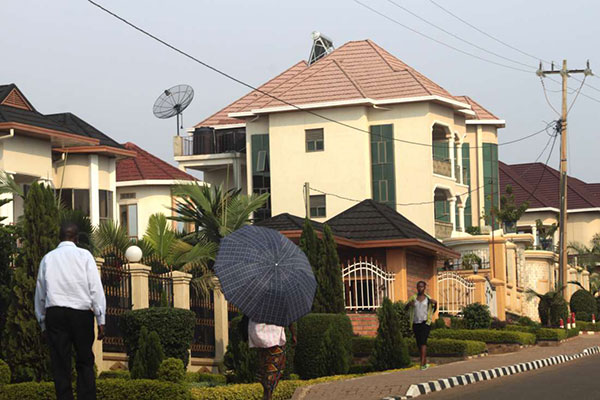The Rwandan government is walking a tightrope as it plans to introduce new property taxes based on market prices, as it moves to boost domestic revenues to finance its development plans amid declining aid flows.
According to the draft proposal currently before parliament, which The EastAfrican has seen, the government plans to introduce a five per cent capital gains tax on any sale and transfer of immovable property valued above Rwf30 million ($35,000).
This is in addition to a progressive tax regime targeting residential and commercial properties, a move that is currently facing resistance from members of parliament who argue that the proposed levies will add pressure on tax payers who are already overwhelmed.
Experts argue that the proposed new tax structure would bring many richer tax payers up to rates previously paid by the poorer ones, as well as other tax-payers in the region and internationally.
However, if effectively implemented, the new property taxes are expected to hugely boost domestic revenue which currently stands at approximately 16.1 per cent of GDP, according to International Monetary Fund (IMF) experts who have recommended the move, urging government to expedite passing of the Income Tax and Property Bill into law.
Rwanda has taken numerous tax policy and revenue administrative measures to boost domestic revenues, which increased some six percentage points of GDP from 2010 to 2016 according to the IMF.
Tax rates
Tax policy measures have included introducing value added tax (VAT) on mobile airtime, royalty taxes on mining and taxes for special petroleum and infrastructure funds.
Specifically, residential houses will attract a 1 per cent tax rate of the market value for houses above Rwf30 million ($35,000) to be implemented progressively over four years — 0.5 per cent in the first year, 0.7 per cent in the second year, 0.8 per cent in the third year, and 1.per cent in the fourth year.
Commercial buildings will attract 0.5 per cent tax rate of the market value to be implemented progressively — 0.2 per cent in the first year, 0.3 per cent in year two, 0.4 per cent in year three, and 0.5 per cent in the fourth year.
Industrial buildings will attract a flat rate of 0.1 per cent in line with “Made in Rwanda” framework as the country seeks investors to promote local production to boost exports.
“The proposed reform is important for decentralised entities to mobilise resources that are needed to provide basic infrastructure for economic development and efficient services delivery,” the draft proposal reads.
Currently, property owners pay a land lease fee and about two per cent pay fixed asset property tax.
Land lease fees
Land fees are regressive with low income property owners liable to pay 1-3 per cent of fixed asset values, with owners of more valuable properties paying less than 0.15 per cent, according to an August 2016, working paper published by experts at the International Think Tank- International Growth Centre (IGC).
The land lease fees and fixed assets generated little revenue about Rwf4.3 billion and Rwf 0.5 billion respectively in 2015/16, comprising of less than 1 per cent of total tax revenues and 0.1 per cent of GDP, figures which experts say are low by international comparison.
Property and land taxes in Europe, United States, many successful urbanisers in East Asia and sub-Saharan Africa are typically 0.5-1 per cent of market value, and generate about five per cent or more of total tax revenues and two per cent GDP.
According to the IGC working paper, the East Asian developmental states made property and land taxes a particularly important part of their development strategies; not only did they generate sustainable revenue for urban investment, they also allowed the government to reduce other taxes in other sectors, improving incentives for investment in productive industry rather than land speculation.
Property tax in East Africa
Across the region, while definite up-to-date figures are not available, all countries suffer from outdated valuation rolls, which undermine real revenues substantially, according to IGC experts.
Uganda’s property tax rate is set by the local authority, but tends to be approximately 1 per cent; however, owner-occupied homes are exempt. In Nairobi, face value taxes are extremely high.
For example, 34 per cent land tax was proposed in 2015, but experts say these result from grossly under-valued properties as valuation rolls were last updated in 1982.
A UN-Habitat report published in 2013 which compared property tax regimes in East Africa shows they vary with extreme diversity in tax base definitions while the basis for assessing property value also differs substantially.
For example, Tanzania taxes only buildings, Kenya taxes only land while Uganda taxes buildings and land. While Uganda uses annual rental value, Kenya uses capital-based unimproved site valuation.
Although Tanzania law supports use of market capital value, all building valuation is based on the replacement cost approach.
Tax rates also vary in terms of structure, graduation of rates by value or property type and the freedom of local authorities to set rates.
Meanwhile, the Rwanda Institute of Valuers is conducting a valuation exercise which will inform the land values to be in ministerial order.
Key exemptions are: Affordable houses whose market value is below the one to be set by the ministerial order at a cost for a decent affordable house – currently Rwf30 million ($35,000) is used as a reference; properties donated by government or local administration to vulnerable groups; land for agriculture not exceeding two acres; properties belonging to SMEs with market value not exceeding Rwf 30 million; and immovable properties belonging to foreign diplomats.



